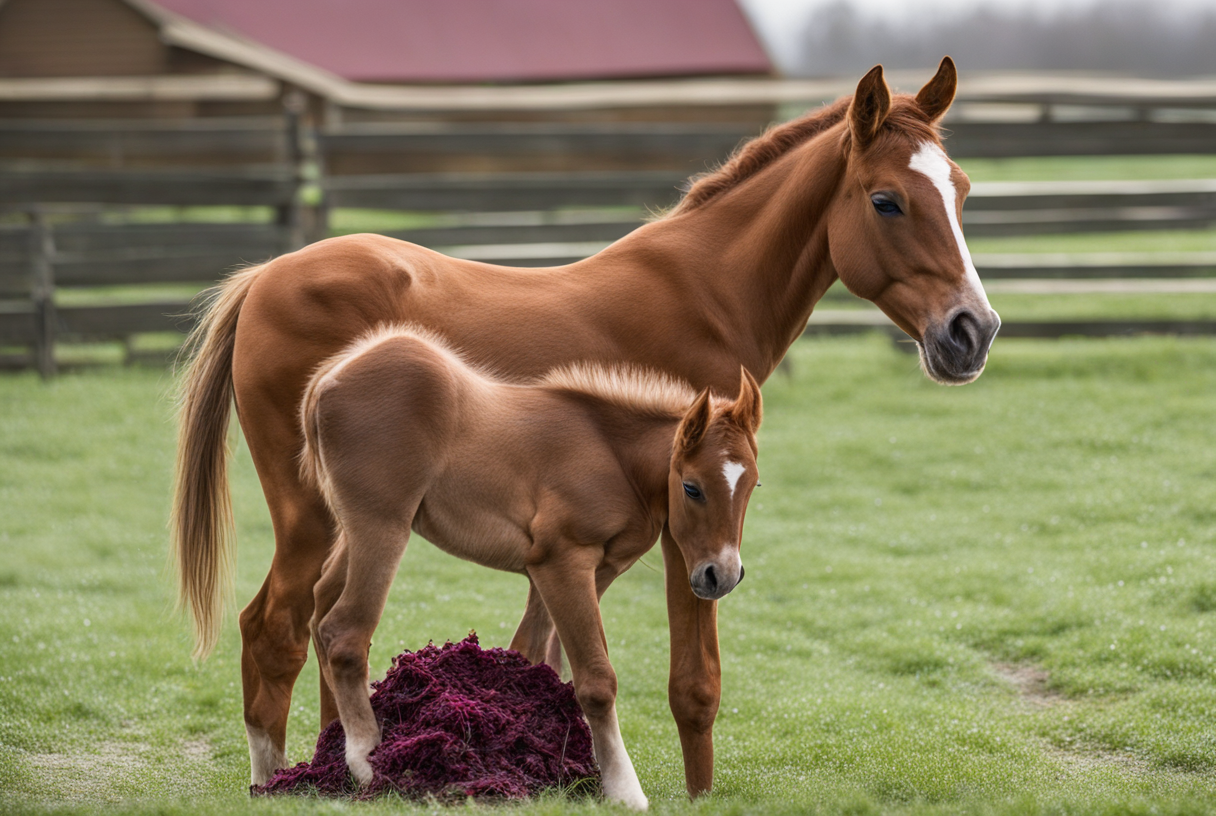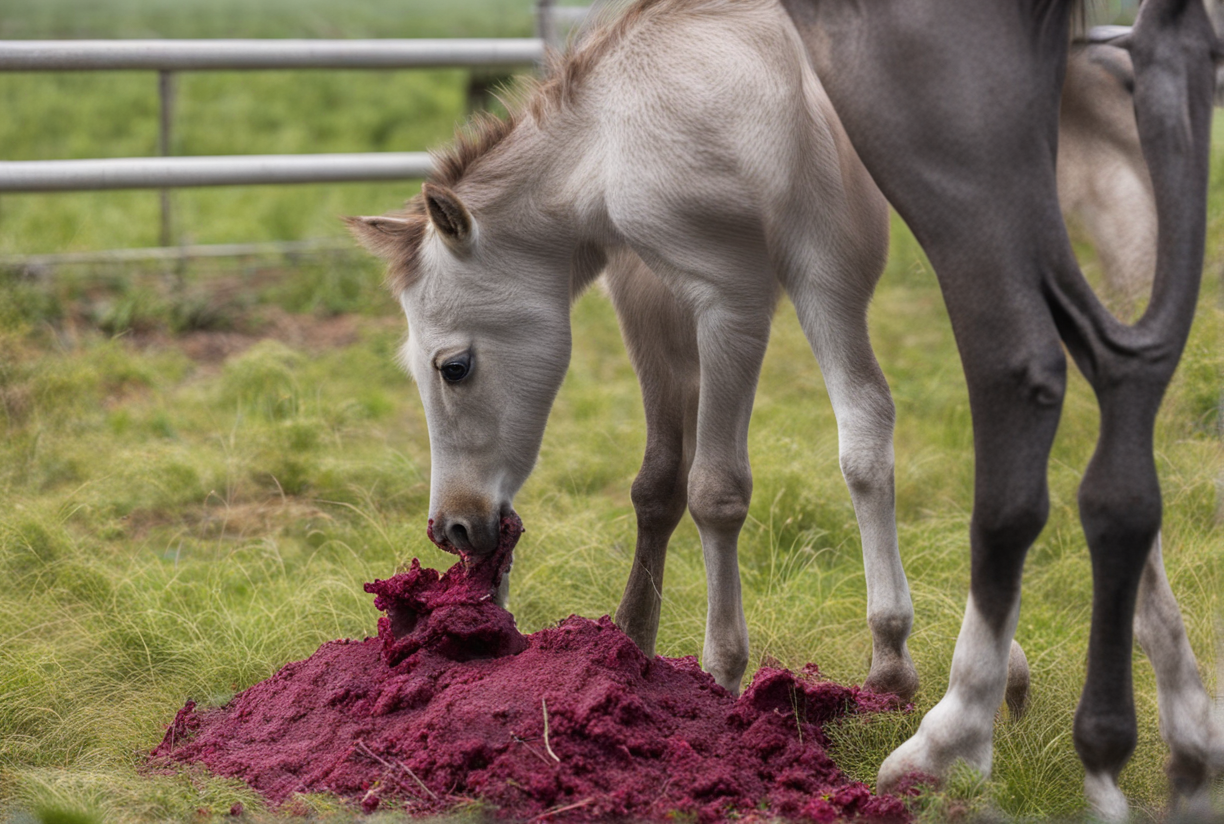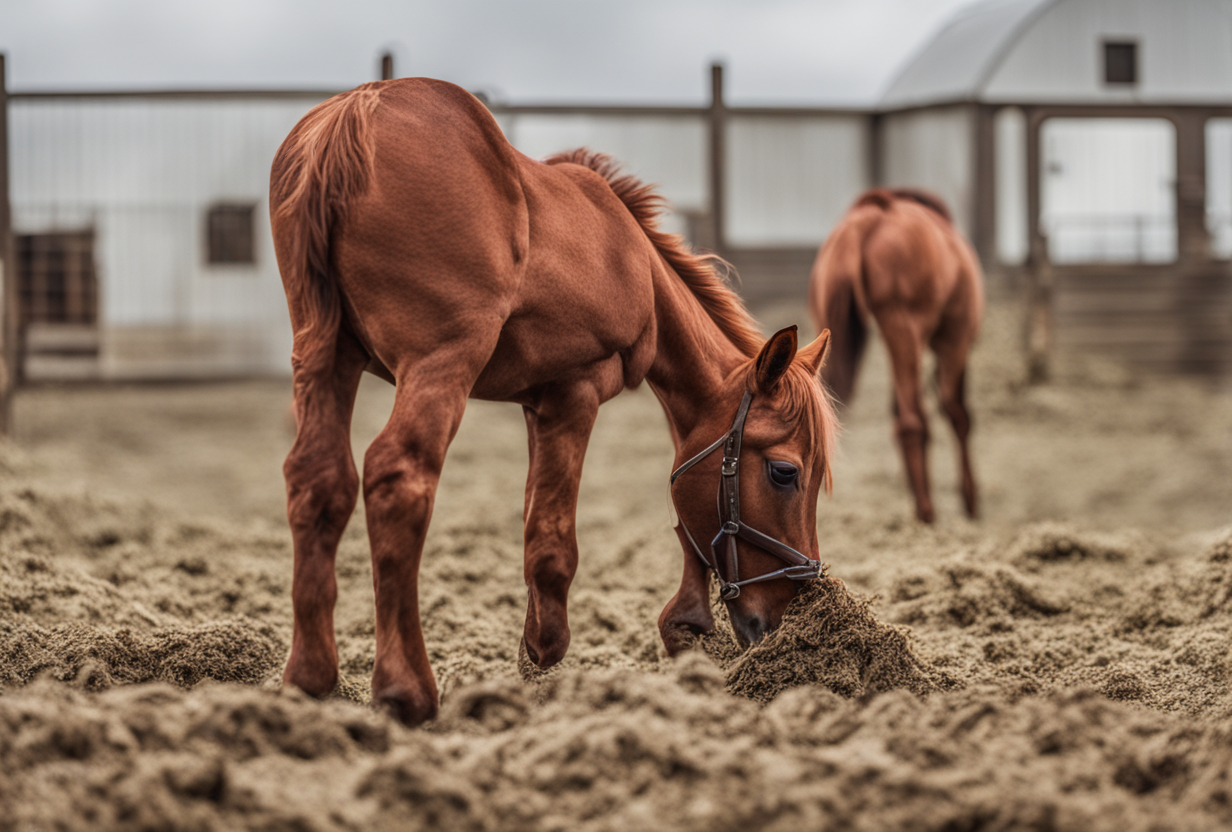The other day, I caught my little filly Sally red-handed pillaging the beet pulp bag.
Now I always knew beet pulp was good eats for horses, but wasn’t sure if it was cool for babies too.
So I did some digging to find out just how much your foal will dig the beet.
Turns out beet pulp is A-OK for foals, and maybe even their new fave snack!
Keep readin’ to learn what makes beet pulp so boss for baby horses and how to feed it up right.
Table of Contents
Beet Pulp is Nutritious as Heck!

Beet pulp is what’s left after they squeeze all the sugar outta sugar beets. While it ain’t the prettiest lookin’ chow, this stuff is packed with vitamins and minerals growing foals need.
Beet pulp is low in calories so it won’t make your foal pudgy, but high in fiber to keep things moving downstairs. It’s also loaded with calcium for strong bones and teeth, magnesium to help muscle and nerve function, phosphorus for energy and building tissue, potassium for electrolyte balance, and more.
Not only that, but beet pulp contains B vitamins like riboflavin and niacin to support health and growth. It even has a bit of protein to help build and repair both muscle and organ tissue.
With nutrients like these, no wonder my Sally was riskin’ life and limb for that beet pulp bag!
Fiber for Days Keeps the Vet Away

You’ve seen how foals are always bucking and kicking – they never seem to run outta gas in that tiny body! All that zooming around works up quite an appetite and keeps their digestion in overdrive.
The fiber in beet pulp aids little tummies by moving things along at a steady, healthy pace. It bulks up their business so everything passes on through smoothly.
Unlike grass hay, beet pulp is a soluble fiber that dissolves more slowly in the gut. This means foals won’t wolf it down only to have it sit like a rock in their stomach, but it also won’t shoot through them too fast.
The soluble fiber helps create those smooth, soft manure piles we all love to see. Fiber keeps foals regular without stressing their sensitive systems – talk about a win-win if I ever saw one!
Introduce Beet Pulp Gentle-Like
While beet pulp agrees with foals, any new food needs a gradual introduction. Just like you wouldn’t feed a baby human an entire pizza as a first meal, go low and slow with beet pulp at first.
Start by mixing a mere half cup into your foal’s regular chow over the course of a week. Increase it by half a cup each week until they’re getting about a quarter of their daily intake as beet pulp with rest being their normal feed.
Going slow and steady gives little tummies time to get used to all that fiber goodness. It also lets you keep an eye out for any signs it ain’t sitting right, which is super unlikely but worth checking.
And always keep fresh grass hay available for extra cushion – fiber on fiber keeps things shipshape down belowdeck, if you know what I mean!
Other Beet Pulp Tips and Tricks

Here’s a few more tips that’ll help you and your foal love life with beet pulp:
Soak beet pulp for at least ten minutes before serving – this softens it up for tiny mouths that haven’t grown their big boy teeth yet.
Stored any leftover soaked beet pulp in an airtight container in the fridge, where it’ll stay fresh for up to three days.
Look for pelleted beet pulp in addition to the stringy strands – the mini muffin-shaped pellets are bite-sized and super convenient for foals.
One pound of soaked beet pulp contains about a quart of water, so it counts toward their daily fluid intake too. Bonus hydration!
In summary, I promise your foal will be as obsessed with beet pulp as my Sally girl. It’s nutritious, supportive digestion, and fiber for days – a perfect fit for a growing baby horse.
Give beet pulp a whirl, friend, your foal will thank you for it!
How Beet Pulp Fights Colic Risk
Colic is one of the biggest health threats for foals and horses.
Their long, twisting intestine can trap gas and cause painful spasms if things don’t move through smoothly.
The high fiber in beet pulp helps prevent this by keeping digestion regular.
Soluble fibers like in beet pulp dissolve gradually to prevent hard chunks that could cause colic.
They also encourage the growth of good gut bacteria to further support digestion.
Foals who eat enough fiber are less likely to develop impactions and other issues that can cause colic pain.
By including beet pulp, you give your foal a natural defense against potentially deadly colic episodes.
Managing Weight Gain with Beet Pulp
While fiber from beet pulp prevents overeating, foals still need careful calorie management.
Their growth patterns demand high-quality fuel but leaving them empty can stall development.
Beet pulp offers less than one calorie per gram meaning it fills them up without adding major pounds.
You can adjust how much of the daily grain ration to replace with beet pulp depending on your foal’s individual needs.
Working with your vet and body condition scores helps determine the right amount for healthy weight gain without excess.
Beet pulp ensures fullness without overconsumption of higher calorie feeds that could cause obesity issues.
Paired with exercise and good pasture access, beet pulp makes an ideal part of your growing foal’s balanced diet.
Dental Benefits of Eating Beet Pulp
Did you know what foals eat affects how their adult teeth erupt?
Crunchy, fibrous feeds like beet pulp encourage natural jaw, lips and tooth development.
Chewing stimulates blood flow and nutrients to growing facial structures and erupting teeth.
The fibrous beet pulp cleans teeth as they chew and helps scrape away plaque and tartar.
This reduces future dental issues as an adult that result from improper eruption as a foal.
Adult horses who ate enough fiber as youngsters tend to need less floating and other dental work.
Adding beet pulp fosters healthy teeth from the very start in a very natural way.
Beet Pulp Boosts Hydration
We all know how important water is for foals, but getting them to drink enough can be tricky.
Beet pulp soaks up huge amounts of water as it digests, about a quart per pound to be exact.
This hydrates foals from the inside out without them realizing it’s “water.”
The high water content also keeps beet pulp soft even after sitting out for a while.
Foals nursing mares may not drink much extra but weaned babies consuming only grain and hay can benefit from beet pulp’s hydration.
It’s an easy way to ensure proper hydration especially on hot days when water intake matters most.
Your foal basically gets their fluid while enjoying a yummy high-fiber treat too!
Supports Growth Plate Development
Calcium, phosphorus and other key minerals in beet pulp aid growing foals in another important way.
These nutrients help form new cartilage and bone cells as growth plates in legs fuse during development.
Growth plates are the areas of cartilage near joints that facilitate lengthening of long bones.
Proper mineral balance supports optimal growth plate fusion which sets foals up for lifetime soundness.
Supplementing a moderate forage diet with beet pulp’s minerals assist bones reaching full genetic potential.
This reduces orthopedic issues as an adult from uneven growth stresses informative years.
Beet pulp mineral package nurtures structural growth from the ground up!
Encourages Self-Feeding Skills
Learning to feed independently is another important milestone for baby horses.
Offering beet pulp, a yummy, easy-to-eat treat fosters this natural progression.
Its enticing aroma and soft texture motivates foals to nibble on their own.
I like to scatter a flake of hay with beet pulp mixed throughout to challenge their foraging instincts.
This low-pressure exposure helps them understand where food comes from without handouts.
It builds confidence for future weaning without excess weight gain from corn or grains.
Beet pulp empowers foals to self-feed earlier like nature intended.